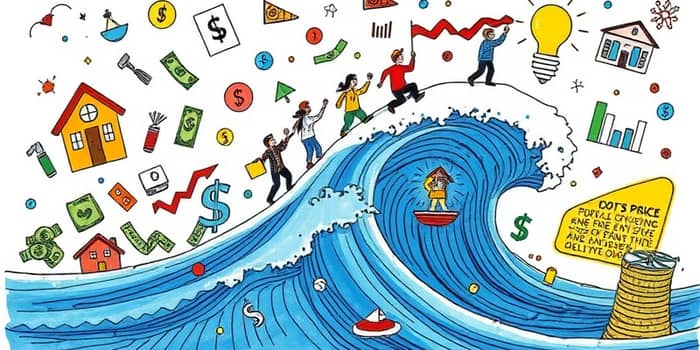Every day, prices for groceries, utilities, and services inch upward, quietly reshaping our financial realities.
When you pay more for the same items, it’s not just your wallet that feels the strain but your long-term plans as well.
Understanding Inflation
Inflation is the rate at which the general level of prices for goods and services increases over time.
It can be driven by an increase in the money supply, demand-pull pressures, or supply chain disruptions.
When inflation outpaces savings interest, it erodes the value of cash savings and forces consumers to rethink their strategies.
By grasping its root causes, you can better prepare to shield your finances from its effects.
How Inflation Affects Your Finances
Different areas of personal finance respond uniquely to rising prices.
- Savings: When your account earns 1% interest but inflation is 3%, your real return is negative.
- Fixed Income Investments: Bonds or CDs lose ground if inflation exceeds the stated yield.
- Retirees and Fixed Incomes: Pension recipients may see their purchasing power decrease if payouts don’t adjust.
- Debt: Borrowers with fixed-rate loans benefit as the real value of repayments declines over time.
Strategies to Counteract Inflation
Proactive planning can help you maintain and grow the purchasing power of your assets.
- Invest in real assets: Real estate and commodities often keep pace with or outstrip inflation.
- Stock Market Investments: Equities have a historical edge against rising prices when held long term.
- Inflation-Protected Instruments: Treasury Inflation-Protected Securities adjust returns to inflation levels.
- Budgeting and Financial Planning: Forecast future costs and prioritize essential spending.
- Increase your earning potential: Enhance skills and seek promotions to grow income.
Economic Context and Trends
Monitoring current and forecasted inflation rates gives valuable context for decision-making.
In late 2023, national inflation averaged around 2.6%, though local variations can be significant.
Understanding these trends enables you to adjust portfolios and spending habits accordingly.
Important Considerations for Different Groups
Inflation’s impact varies by age, income, and stage of life.
- Younger Workers: Focus on career growth, skill development, and early investing.
- Retirees and Soon-to-Retire: Diversify into income-generating assets and consider inflation riders.
- Low- to Moderate-Income Households: Trim non-essential expenses and explore assistance programs.
By tailoring strategies to your situation, you can reduce vulnerability and build resilience.
Inflation is an ever-present economic force, but with knowledge and action, it doesn’t have to derail your goals.
Regularly review your portfolio, adapt your budget, and seek opportunities to grow income.
Above all, commit to continuous learning and flexibility in your financial plans.
With thoughtful steps, you can take control of your financial future and thrive even as prices climb.
References
- https://www.pnc.com/insights/personal-finance/save/how-does-inflation-affect-savings.html
- https://finred.usalearning.gov/Money/Inflation
- https://www.usbank.com/financialiq/invest-your-money/investment-strategies/effects-of-inflation-on-investments.html
- https://www.imf.org/en/Publications/fandd/issues/Series/Back-to-Basics/Inflation
- https://www.westernsouthern.com/investments/the-impact-of-inflation-on-your-savings-and-investments
- https://www.kiplinger.com/personal-finance/how-inflation-affects-your-finances-and-how-to-stay-ahead
- https://www.rbfcu.org/learn/its-a-money-thing/understanding-inflation
- https://www.astoncarter.com/en/insights/articles/how-inflation-increases-affect-accounting-and-finance-teams










